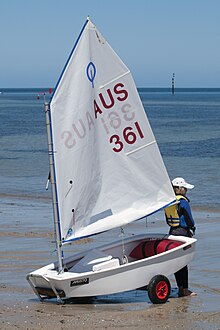pram
English
Lua error in Module:parameters at line 848: Parameter "dab" is not used by this template.
Etymology 1
Pronunciation
- Lua error in Module:parameters at line 370: Parameter 1 should be a valid language or etymology language code; the value "RP" is not valid. See WT:LOL and WT:LOL/E. enPR: prăm, IPA(key): /pɹæm/
Audio (AU): (file) - Rhymes: -æm
Noun

pram (plural prams)
- (UK, Australia, New Zealand) A small vehicle, usually covered, in which a newborn baby is pushed around in a lying position; a perambulator.
- 1975, Margaret Drabble, The Realms of Gold, 1977, page 127,
- Janet Bird née Ollerenshaw was pushing her pram along Tockley High Street.
- 2006, Diane Setterfield, The Thirteenth Tale, unnumbered page,
- For a start the pram was heavier than it appeared, and also they were pulling it along very uneven ground. The edge of the field was slightly banked which tilted the pram at an angle.
- 2012, Ramsey Campbell, Dark Companions, page 233,
- Stepping over her, he unbuttoned the pram′s apron and pulled it back.
- At first he couldn′t make out what the pram contained. He had to crane himself over, holding his body back from the obscuring light. The pram was full of groceries—cabbage, sprouts, potatoes.
- 1975, Margaret Drabble, The Realms of Gold, 1977, page 127,
Synonyms
Coordinate terms
- (vehicle in which an infant or toddler is pushed in sitting position): baby buggy, pushchair, pusher, stroller
Translations
perambulator
|
Etymology 2
From Dutch praam (“a flat-bottomed boat”), from Middle Dutch praem, from Middle Low German prām, from Old Czech *prám, from Proto-Slavic *pormъ.

Alternative forms
Pronunciation
- Lua error in Module:parameters at line 370: Parameter 1 should be a valid language or etymology language code; the value "RP" is not valid. See WT:LOL and WT:LOL/E. enPR: präm, IPA(key): /pɹɑːm/
- Rhymes: -ɑːm
Noun
pram (plural prams)
- (nautical, historical) A flat-bottomed barge used on shallow shores to convey cargo to and from ships that cannot enter the harbour.
- (nautical, historical) A similar barge used as platform for cannons in shallow waters which seagoing warships cannot enter.
- A type of dinghy with a flat bow.
- 1979 August, F. M. Paulson, Car-topable Craft, Field & Stream, page 50,
- Although the pram, like the johnboat, has a squared-off bow as well as stern, the bow lines on the pram will be narrower than those encountered on a johnboat.
- 1994, Dave Hughes, Fly Fishing Basics, unnumbered page,
- Nothing can beat the simple pleasure of paddling a pram around on a foggy dawn, probing pad flats, stumps and fallen logs for lurking bass.
- 1979 August, F. M. Paulson, Car-topable Craft, Field & Stream, page 50,
Translations
flat-bottomed barge
type of dinghy
|
Anagrams
Dutch
Etymology
From pramen.
Pronunciation
Noun
pram m (plural prammen, diminutive prammetje n)
- (colloquial, vulgar) A boob, a tit.
- (obsolete) A breast of a breastfeeding woman or a teat of a suckling female.
Norwegian Nynorsk
Etymology
From Old Norse prámr, from Middle Low German prām, from Old Czech *prám, from Proto-Slavic *pormъ.
Pronunciation
Noun
pram m (definite singular prammen, indefinite plural prammar, definite plural prammane)
References
- “pram” in The Nynorsk Dictionary.
Serbo-Croatian
Etymology 1
From Proto-Slavic *pormъ.
Pronunciation
Noun
prȁm m (Cyrillic spelling пра̏м)
- (historical, seafaring) ferry
Declension
Declension of pram
Etymology 2
From prȁmēn.
Pronunciation
Noun
prȃm m (Cyrillic spelling пра̑м)
Declension
Declension of pram
References
Categories:
- English clippings
- English 1-syllable words
- English terms with IPA pronunciation
- English terms with audio pronunciation
- Rhymes:English/æm
- English lemmas
- English nouns
- English countable nouns
- British English
- Australian English
- New Zealand English
- American English
- English terms borrowed from Dutch
- English terms derived from Dutch
- English terms derived from Middle Dutch
- English terms derived from Middle Low German
- English terms derived from Old Czech
- English terms derived from Proto-Slavic
- Rhymes:English/ɑːm
- en:Nautical
- English terms with historical senses
- English heteronyms
- English terms with multiple etymologies
- en:Babies
- en:Watercraft
- Dutch terms with IPA pronunciation
- Dutch terms with audio pronunciation
- Rhymes:Dutch/ɑm
- Dutch lemmas
- Dutch nouns
- Dutch nouns with plural in -en
- Dutch masculine nouns
- Dutch colloquialisms
- Dutch vulgarities
- Dutch terms with obsolete senses
- Norwegian Nynorsk terms inherited from Old Norse
- Norwegian Nynorsk terms derived from Old Norse
- Norwegian Nynorsk terms derived from Middle Low German
- Norwegian Nynorsk terms derived from Old Czech
- Norwegian Nynorsk terms derived from Proto-Slavic
- Norwegian terms with IPA pronunciation
- Norwegian Nynorsk lemmas
- Norwegian Nynorsk nouns
- Norwegian Nynorsk masculine nouns
- nn:Watercraft
- Serbo-Croatian terms inherited from Proto-Slavic
- Serbo-Croatian terms derived from Proto-Slavic
- Serbo-Croatian terms with IPA pronunciation
- Serbo-Croatian lemmas
- Serbo-Croatian nouns
- Serbo-Croatian masculine nouns
- Serbo-Croatian entries with topic categories using raw markup
- Serbo-Croatian entries with language name categories using raw markup
- Serbo-Croatian terms with historical senses
- Serbo-Croatian terms with multiple etymologies
- sh:Watercraft
